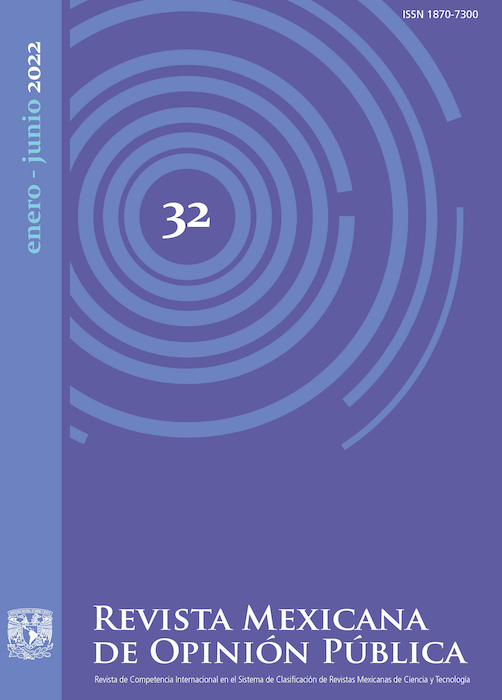The Ideology of Independent Voters and their Electoral Choice in the 2021 Federal Deputies’ Election
Main Article Content
Abstract
This paper analyzes the political behavior of independent voters in the 2021 federal deputies’ election, emphasizing the way the ideological traits of independents guide their electoral choice in favor for and against the political parties. Findings show that independents with no ideological position and left-wing independents were more likely to cast a vote in favor of the Juntos Hacemos Historia electoral coalition, whereas right-wing independents were more likely to vote for the Va por México electoral coalition. Independents located in the ideological center split their vote between the two main parties. Furthermore, right-wing independents and center independents valued the economy and security more in their electoral choice, while left-wing independents and those with no ideological position were more concerned with the vaccination program against Covid-19. These findings represent a theoretical and empirical contribution to the research of partisan independence in Mexico.
Article Details
Citas en Dimensions Service
References
AMES, Barry y Amy Erica SMITH. “Knowing Left from Right: Ideological Identification in Brazil, 2000-2006”. Journal of Politics in Latin America, 2010.
BLACK, Duncan. The theory of comittees and elections. Cambridge: Cambridge University Press, 1958.
CAMPBELL, Angus, Philip E. CONVERSE, Warren E. MILLER y Donald E. STOKES. The American Voter. Nueva York: John Wiley & Sons, 1960.
CASTRO, Rodrigo. “How do campaigns matter? Independents, Political Information and the Enlightening Rol of campaigns in Mexico”. International Journal of Public Opinion Research 33, núm. 4 (2021). https://doi.org/10.1093/ijpor/edaa029
CISNEROS, Isaac. “Debate: Análisis del voto 2021 y estructura socio-espacial en la zona metropolítica del Valle de México”. Video de YouTube, publicado el 14 de junio de 2021. https://www.youtube.com/watch?v=bRYjdvF8dO0.
CISNEROS, Isaac. “Independencia partidista en América Latina: Actitudes, comportamiento y decisión de voto”. Latin American Research Review 55, núm. 4 (2020): 1-21. https://doi.org/10.25222/larr.457.
COLOMER, Josep y Luis ESCATEL. “La dimensión izquierda-derecha en América Latina”. Desarrollo Económico 45, núm. 177 (2005): 123-36.
CORONA, Sonia. “El voto de castigo a Morena o algo de fierro viejo que venda”. El País, 7 de junio de 2021. https://elpais.com/mexico/elecciones-mexicanas/2021-06-08/el-voto-de-castigo-a-morena-o-algo-de-fierro-viejo-que-venda.html.
DALTON, Russell. “Cognitive mobilization and partisan delignment in advanced industrial democracies”. The Journal of Politics 46, núm. 1 (1984): 264-84.
DALTON, Russell. The apartisan american. Los Ángeles: SAGE, 2013.
DOWN, Anthony. “An Economic Theory of Political Action in a Democracy”. Journal of Political Economy 65, núm. 2 (1957): 135-150.
ESTRADA, Luis. “Determinantes y características de los independientes en México”. Política y Gobierno XIII, núm. 1 (2006): 149-173.
GERRING, John. “Ideology: a definitional análisis”. Political Research Quarterly 50, núm. 4 (1997): 957-994.
GREENE, Kenneth. “Campaign Persuasion and Nascent Partisanship in Mexico’s New Democracy”. American Journal of Political Science 55, núm. 2 (2011): 398-416. https://doi.org/10.1111/j.1540-5907.2010.00497.x.
HUBER, John. “Values and Partisanship in left-right orientations: measuring ideology”. European Journal of Political Research 17 (1989): 599-621.
JOST, John, Christopher FEDERICO y Jaime NAPIER. “Political Ideology: Its Structure, Functions, and Elective Affinities”. Annual Review of Psychology 60 (2009): 307- 37.
JOST, J. T. “Ideological asymmetries and the essence of political psychology”. Political Psychology 38, núm. 2 (2017): 167-208.
KEITH, Bruce, David MAGLEBY, Candice NELSON, Mark WESTLYE, Elizabeth ORR y Raymond WOLFINGER. The myth of the independent voter. Los Ángeles: University of California Press, 1992.
KITSCHELT, Herbert, Juan Pablo LUNA, Guillermo ROSAS y Elizabeth ZECHMEISTER. Latin American party systems. Nueva York: Cambridge University Press, 2010.
LEWIS-BECK, Michael y Kevin CHLARSON. “Party, Ideology, Institutions and the 1995 French Presidential Election”. British Journal of Political Science 32 (2002): 489-512.
LEWIS-BECK, Michael y Mary STEGMAIER. “Economic models of voting”. The Oxford Handbook of Political Behavior: Oxford University Press: 2007.
LUSKIN, Robert. “Explaining political sophistication”. Political Behavior 12, núm. 4 (1990): 331-61. https://doi.org/10.1007/BF00992793.
MAIR, Peter. “Left-right orientations”. Oxford handbooks online: The Oxford handbook of political behavior, 206-22. Oxford: Oxford University Press, 2007.
MEIXUEIRO, Gustavo. “Los electores independientes en México en 2006 y 2012”. El comportamiento electoral mexicano en las elecciones de 2012, Ciudad de México: Centro de Estudios Sociales y de Opinión Pública, 2014, 141-72.
MORENO, Alejandro. ¿La clave del revés a Morena? Los apartidistas, 8 de junio de 2021. https://www.elfinanciero.com.mx/nacional/2021/06/08/apartidistas-inclinan-la-balanza-a-favor-de-va-por-mexico/.
MORENO, Alejandro. El cambio electoral. Votantes, encuestas y democracia en México. Ciudad de México: Fondo de Cultura Económica, 2018.
MORENO, Alejandro. La decisión electoral. Votantes, partidos y democracia en México. Ciudad de México: Porrúa, 2009.
PETROCIK, John. “Measuring party support: leaners are not independents”. Electoral Studies 28 (2009): 562-72. https://doi.org/doi:10.1016/j.electstud.2009.05.022.
PIERCE, Roy. Choosing the chief: presidential elections in France and the United States. Ann Arbor: University of Michigan Press, 1995.
SOMUANO, María Fernanda. “Capítulo IV. Las identidades partidistas de los mexicanos y la elección de 2012”. El comportamiento electoral mexicano en las elecciones de 2012, Ciudad de México: Centro de Estudios Sociales y de Opinión Pública, 2014, 117-40.
TORCAL, Mariano. “Bases ideológicas y valorativas del votante mexicano y su efecto en el voto. Síntomas de una creciente institucionalización”. El comportamiento electoral mexicano en las elecciones de 2012, Ciudad de México: Centro de Estudios Sociales y de Opinión Pública-ITAM, 2014, 91-116.
ZALLER, John. The Nature and Origins of Mass Opinion. New Yor: Cambridge University Press, 1992.
ZECHMEISTER, Elizabeth. “Left-Right identifications and the Latin American Voter”, en The Latin American Voter. Pursuing representation and accountability in challenging contexts, Michigan: University of Michigan Press, 2015, 195-225.
ZECHMEISTER, Elizabeth. “Qué es la Izquierda y quién está a la Derecha en la política mexicana. Un enfoque con el método Q al estudio de las etiquetas ideológicas”. Política y Gobierno 13, núm. 1 (2006): 51-98.

Revista Mexicana de Opinión Pública por Universidad Nacional Autónoma de México se distribuye bajo una Licencia Creative Commons Atribución-NoComercial-SinDerivar 4.0 Internacional.
Basada en una obra en http://revistas.unam.mx/index.php/rmop.




